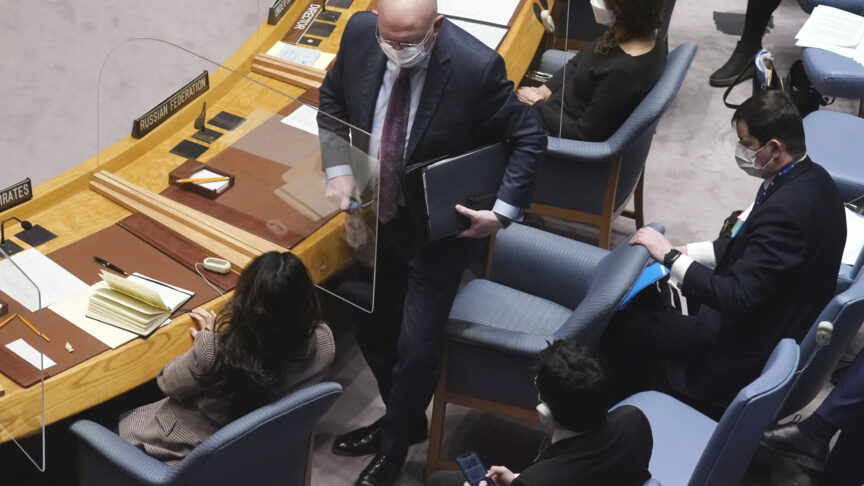International law and the invasion of Ukraine
Countries that have condemned Russia’s actions are not only trying to protect Ukraine and its citizens, but also defending the principle that relationships between states should be shaped by legal principles
Russia’s invasion of Ukraine is a clear act of aggression and a manifest violation of Article 2.4 of the UN Charter, which prohibits the “use of force against the territorial integrity or political independence of any State”. In his speech announcing the attack on Ukraine, President Vladimir Putin made various attempts to justify Russia’s actions. He pointed to what he described as Western violations of international law in Kosovo, Iraq, and Libya. But – leaving aside the differences between these cases – they have no bearing on the illegality of Russia’s moves.
Referring directly to the UN Charter, Putin also argued that the invasion was an act of self-defence – one designed to protect both Russia and the separatist enclaves in Donbas from an assault by Ukraine and NATO. These claims are nonsense. Neither Ukraine nor NATO had launched or was about to launch any such attack. And, as the enclaves are not independent states (despite the fact that Russia recognised them as such), they cannot ask another state to defend them. In any case, in the run-up to the invasion, there was much more force directed outwards from the enclaves than against them.
Russian soldiers could face charges if they deliberately target civilians, use disproportionate force in attacking military targets, or summarily execute prisoners
The prohibition on the unjustified use of force is the cornerstone of modern international law. However, that does not necessarily mean that there is any tribunal that can pass judgement on Russia’s violation. The International Court of Justice, which deals with disputes between states, can only intervene in cases where the countries involved agree that it should have a role. Ukraine has already brought a case against Russia for its attacks since 2014, but it was only able to do so for breaches of conventions on terrorist financing and racial discrimination rather than for a violation of the UN Charter.
Aggression is also a crime incurring individual responsibility. Defendants were prosecuted for aggression in the Nuremberg and Tokyo trials after the second world war. The statute of the International Criminal Court (ICC), which was established in 1998 to prosecute individuals for violations of international criminal law, was amended in 2010 to establish its jurisdiction over aggression. The crime is defined in the ICC statute as the planning, preparation, initiation, or execution by a senior political or military leader of an act of aggression that manifestly violates the UN Charter.
Ukraine has accepted the jurisdiction of the ICC, even though it is not formally a member of the court. However, there is a catch: in this case, the amendments incorporating the crime of aggression set restrictions on the court’s reach that do not apply to other international crimes. One of these limitations is that the ICC can only prosecute cases of aggression when both the attacking state and the victim state are members of the court. Russia has not joined the ICC. And Ukraine has accepted ad hoc jurisdiction but has not ratified the court’s statute. Accordingly, Putin and senior officials need not fear prosecution before the ICC for this crime.
However, some countries allow prosecution of the crime of aggression in their national law under the principle of universal jurisdiction. While Putin and senior Russian officials might be immune from such prosecution as long as they remain in office, they could face prosecution if they visited certain countries after leaving power.
Meanwhile, Russian commanders and troops could face prosecution for any war crimes they commit during the invasion. In the case of war crimes, crimes against humanity, and genocide, the ICC has jurisdiction if the act in question takes place on the territory of a state that has accepted this jurisdiction, even when it is committed by a citizen of a state that has not joined the court. The ICC is already examining possible crimes in Ukraine since 2013, including those committed by Russian troops. Russian soldiers could face charges if they deliberately target civilians, use disproportionate force in attacking military targets, or summarily execute prisoners. This could be a real concern given the record of Russian forces in Syria, where monitoring organisation Airwars has documented 4,621 incidents in which Russian attacks killed civilians. Shortly after the Russian invasion of Ukraine started, the ICC’s prosecutor stated that he would be monitoring the situation closely, and noted that ordering or inciting crimes made individuals liable to prosecution. Every effort should be made to document and preserve evidence of any crimes that forces commit during the course of hostilities.
Russia and Putin may be breaking international law without immediately facing legal proceedings, but this does not mean international law is irrelevant. Countries that have condemned Russia’s actions and taken measures to sanction it are not only trying to protect Ukraine and its citizens, but also defending the principle that relationships between states should be shaped by legal principles rather than merely the balance of power. The justification for sanctions is that the targeted individual or entity is responsible for a breach of international law. The references to international law that so many leaders have made in their statements on the crisis show its importance as a reference point and a standard to guide responses to Russia’s actions.
The European Council on Foreign Relations does not take collective positions. ECFR publications only represent the views of their individual authors.
